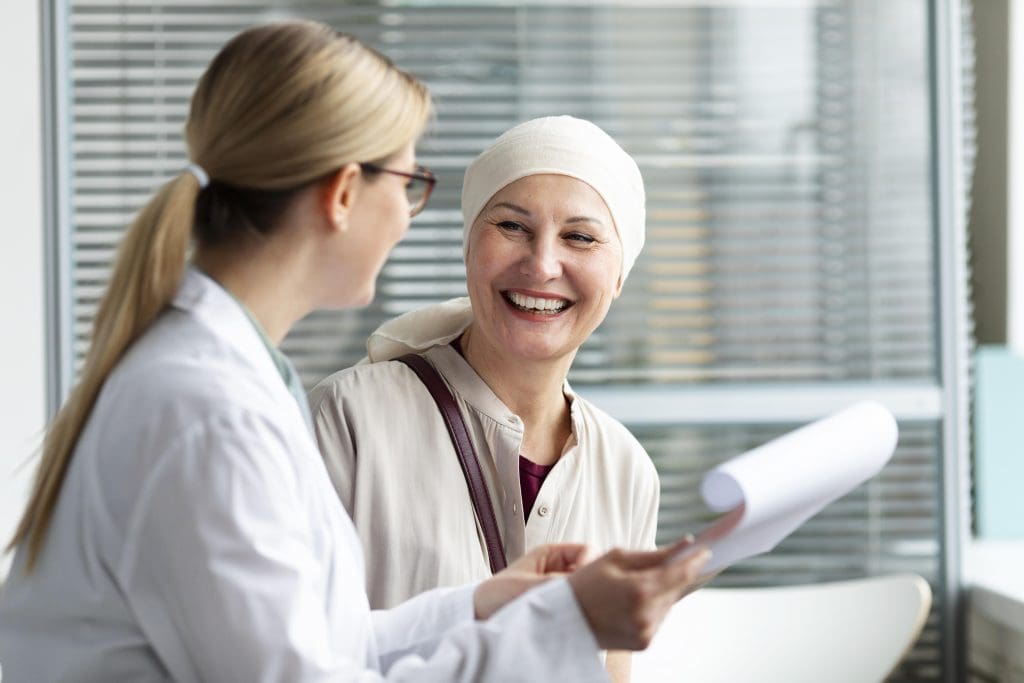How to Fight Cancer Without Chemo? Did you know that nearly 40% of cancer patients in the United States are looking for alternative treatments? They want to go beyond traditional chemotherapy and radiation. This shows a growing interest in integrative cancer care. It’s a mix of conventional and complementary therapies.
Dealing with cancer is a personal and tough journey. We aim to offer full support and look into alternatives to chemotherapy that fit each person’s needs.
We’re dedicated to showing a wide range of alternative cancer treatments that might help. These include nutritional therapies and mind-body interventions. The choices are many and are always getting better.
Key Takeaways
- Exploring alternative treatments can provide additional options for cancer patients.
- Integrative care combines conventional treatments with evidence-based complementary therapies.
- Nutritional therapy is a key component of many alternative cancer treatment plans.
- Mind-body interventions can support overall well-being during cancer care.
- It’s essential to consult with healthcare professionals before starting any new treatment regimen.
Understanding Cancer and Its Conventional Treatments

It’s important for patients to understand cancer and its treatments. Cancer is a disease where cells grow out of control. It can happen anywhere in the body and is a major cause of death, says the American Cancer Society.
What Cancer Is and How It Develops
Cancer starts with genetic changes that mess up cell growth. These changes can come from genes, the environment, or lifestyle. As it grows, cancer can spread to other parts of the body, a process called metastasis.
The growth of cancer goes through several stages. Knowing these stages helps in finding better cancer treatments.
Standard Medical Approaches: Chemotherapy, Radiation, and Surgery
There are three main ways to treat cancer: chemotherapy, radiation therapy, and surgery. Chemotherapy uses drugs to kill cancer cells. Radiation therapy uses rays to destroy cancer cells. Surgery removes tumors and affected tissues.
- Chemotherapy is used for cancers that have spread or are at high risk.
- Radiation therapy is applied locally to treat tumors or specific areas.
- Surgery removes tumors and is often used with other treatments.
Side Effects and Limitations of Conventional Treatments
Conventional cancer treatments can have side effects. Chemotherapy can cause nausea, hair loss, and tiredness. Radiation therapy can lead to skin problems, tiredness, and damage to healthy tissues. Surgery can cause infections, bleeding, and harm to nearby tissues.
Also, these treatments have their limits. They might not work for all cancers. The side effects can really affect a patient’s life. So, looking into other treatment options is important.
Why People Consider Alternatives to Chemotherapy
More people are looking for cancer treatments other than chemotherapy. They want options that improve their quality of life. Stories of those who found success with non-traditional treatments inspire them.
Personal Health Factors and Considerations
Many patients choose alternatives to chemotherapy for health reasons. Some have conditions that make chemotherapy too risky. Others want treatments that fit their health beliefs and lifestyle.
- Pre-existing health conditions: Patients with heart disease, diabetes, or other chronic conditions may need to avoid chemotherapy due to possible complications.
- Age and overall health: Older patients or those with frail health may opt for gentler treatments to preserve their remaining quality of life.
- Personal preferences: Some patients prefer natural or less invasive treatments that align with their personal beliefs about health and wellness.
Quality of Life Concerns
Chemotherapy can have harsh side effects. These can greatly affect a patient’s quality of life. Alternatives are often chosen to keep physical and emotional well-being during treatment.
The desire to maintain normalcy and continue with daily activities is a big reason. Alternative treatments are sought for their promise of a better quality of life. They aim to have fewer side effects and less disruption to daily living.
Stories of Those Who Declined Conventional Treatment
Many people have chosen alternative cancer treatments and seen positive results. Their stories can inspire others to consider non-conventional paths.
“I decided to take control of my treatment by combining conventional methods with alternative therapies like acupuncture and dietary changes. It was a journey that not only helped me survive cancer but also thrive during and after treatment.”
” Jane Doe, cancer survivor
These stories show the benefits of using alternative approaches in treatment plans. They emphasize the importance of informed decision-making. Patients should be active in their care.
The Importance of Informed Decision-Making
Cancer patients have many choices to make. Making informed decisions is key to navigating these options well. When diagnosed with cancer, patients face a lot of treatment options. Each option has its own benefits and risks.
To make good decisions, patients need to understand their cancer diagnosis and the available treatments. They should know how treatments work, their side effects, and how they might affect their quality of life.
Consulting with Healthcare Professionals
Getting advice from healthcare professionals is a critical step. Oncologists, surgeons, radiologists, and others can offer valuable insights. It’s important for patients to ask questions and seek a second opinion when needed.
Healthcare professionals can guide patients based on the latest research and their experience. They can explain complex medical terms and concepts. This helps patients make informed decisions.
| Healthcare Professional | Role in Cancer Treatment |
| Oncologist | Specializes in cancer diagnosis and treatment, including chemotherapy and other systemic treatments. |
| Surgeon | Performs surgical operations to remove tumors and diagnose cancer through biopsies. |
| Radiologist | Uses imaging technologies like X-rays, CT scans, and MRIs to diagnose and treat cancer. |
Researching Treatment Options Thoroughly
Patients should also research treatment options on their own. They should look into the latest clinical trials and understand different therapies. This includes immunotherapy, targeted therapy, and hormone therapy.
By combining professional advice with personal research, patients can make better decisions. This approach can lead to better outcomes and higher patient satisfaction.
Anti-Cancer Nutrition: Foods That Fight Cancer Cells
The food we eat greatly affects our body’s fight against cancer. Eating fruits, vegetables, and whole grains is key. These foods help prevent and treat cancer. By choosing wisely, we boost our body’s defenses against cancer.
Cancer-Fighting Fruits and Vegetables
Fruits and vegetables are full of antioxidants and nutrients. They help fight cancer cells. Some top choices include:
- Leafy Greens: Spinach, kale, and collard greens are rich in antioxidants and other nutrients that support cancer prevention.
- Cruciferous Vegetables: Broccoli, cauliflower, and Brussels sprouts contain compounds that have been shown to have anti-cancer properties.
- Berries: Blueberries, raspberries, and strawberries are high in antioxidants and have been linked to reduced cancer risk.
Foods That May Starve Cancer Cells
Some foods may starve or slow cancer cell growth. These include:
- Turmeric: Contains curcumin, which has been shown to have anti-inflammatory and anti-cancer properties.
- Green Tea: Rich in catechins, which may help prevent cancer cell growth.
- Whole Grains: High in fiber, which can help reduce the risk of certain cancers.
Foods to Avoid During Cancer Treatment
Some foods can hinder cancer treatment or worsen side effects. It’s important to avoid or limit:
- Processed Foods: Often high in unhealthy fats, sugars, and sodium, which can weaken the immune system.
- Red and Processed Meats: Linked to an increased risk of certain cancers.
- Sugary Drinks: Can lead to weight gain and insulin resistance, potentially fueling cancer cell growth.
Eating a balanced diet rich in cancer-fighting foods and avoiding harmful ones helps fight cancer. Always talk to a healthcare professional or a registered dietitian for a personalized nutrition plan.
Powerful Supplements and Natural Compounds
Some natural compounds and supplements may help fight cancer. These include vitamins, minerals, and other substances. They support the body’s fight against cancer.
Vitamins and Minerals with Anti-Cancer Properties
Certain vitamins and minerals might help prevent cancer. For example, Vitamin D helps control cell growth. Selenium protects cells from damage.
- Vitamin C: It’s an antioxidant that boosts the immune system.
- Omega-3 fatty acids: They might reduce inflammation, which is linked to cancer.
- Magnesium: It’s important for DNA repair, which helps prevent cancer.
Medicinal Mushrooms for Cancer Support
Medicinal mushrooms are used in traditional medicine for health benefits. Reishi, Shiitake, and Chaga mushrooms are studied for their immune benefits.
- Reishi mushroom: It’s known to boost the immune system and reduce fatigue.
- Turkey Tail mushroom: It contains PSK, which supports immune function in cancer patients.
Herbal Supplements: Graviola, Niacin, and Others
Herbal supplements like Graviola and Niacin are studied for their anti-cancer effects. Graviola might kill cancer cells. Niacin supports healthy skin and nerves.
- Turmeric/Curcumin: It has anti-inflammatory and antioxidant properties.
- Green Tea Extract: It contains catechins, which might fight cancer.
Always talk to a doctor before adding supplements to your treatment. They can affect treatments or cause side effects.
Fighting Cancer Without Chemo or Radiation: Non-Toxic Approaches
Non-toxic ways to fight cancer are getting more attention. They aim to avoid the harsh side effects of traditional treatments. It’s important to know how they work, their benefits, and any risks.
Hydrogen Peroxide Therapy
Hydrogen peroxide therapy uses a natural compound to kill cancer cells. It’s thought to target cancer cells without harming healthy ones. But, its safety and effectiveness are debated.
Key Considerations:
- The therapy works by releasing oxygen, which is toxic to cancer cells.
- Some studies show promise, but more research is needed.
- There’s a risk of damaging healthy tissues if not used correctly.
Alkaline Water and Cancer Treatment
Alkaline water is used in cancer treatment because cancer cells prefer acidic environments. It’s believed that drinking alkaline water can make the body less welcoming to cancer cells.
Points to Consider:
- The body’s pH levels are hard to change with diet alone.
- Some say alkaline water improves hydration and health.
- There’s little scientific proof linking it to cancer treatment success.
IV Vitamin C and Other Nutrient Therapies
IV vitamin C therapy gives high doses of vitamin C directly into the blood. It’s thought to have anti-cancer effects, though evidence is mostly from early studies.
Potential Benefits:
- High vitamin C levels can boost the immune system.
- Research suggests it might fight tumors.
- It’s usually safe when given correctly.
When looking at these non-toxic methods, talking to a doctor is key. They can help weigh the benefits and risks. This way, you can choose the best treatment for your situation.
Mind-Body Approaches for Cancer Treatment
Mind-body approaches can greatly improve a cancer patient’s life. They focus on the mind, body, and spirit connection. This helps in boosting well-being and fighting cancer.
Meditation and Stress Reduction Techniques
Meditation and stress reduction are key in cancer care. They help lower anxiety, boost mood, and improve sleep. Mindfulness, guided imagery, and deep breathing are great options.
Meditation Benefits:
- Reduces stress and anxiety
- Improves emotional well-being
- Enhances sleep quality
Yoga and Movement Therapies
Yoga combines poses, breathing, and meditation for healing. It helps manage side effects, boosts flexibility, and fights fatigue. There are many yoga styles for everyone.
Reiki and Energy Healing for Cancer
Reiki and energy healing balance the body’s energy field. They promote relaxation, reduce pain, and enhance well-being.
Here’s a comparison of different mind-body approaches:
| Therapy | Benefits | Key Components |
| Meditation | Reduces stress, improves mood | Mindfulness, breathing exercises |
| Yoga | Improves flexibility, reduces fatigue | Physical postures, breathing techniques |
| Reiki | Promotes relaxation, reduces pain | Energy transfer, balancing |
Alternative Medical Systems and Cancer
Alternative medical systems are gaining attention in cancer treatment. They offer unique methods that can work alongside or instead of traditional treatments.
Traditional Chinese Medicine Approaches
Traditional Chinese Medicine (TCM) has been treating health issues, including cancer, for centuries. It uses a holistic approach with herbal medicine, acupuncture, and dietary therapy.
Herbal Medicine in TCM: Herbs like Scutellaria baicalensis and Astragalus membranaceus are studied for their anti-cancer effects. They are thought to boost the immune system and slow tumor growth.
Ayurvedic Medicine for Cancer
Ayurvedic medicine comes from India and aims to balance body, mind, and spirit for health. It employs natural therapies, including herbs and diet changes, to aid in cancer treatment.
| Ayurvedic Herb | Potential Benefits |
| Turmeric | Contains curcumin, which has anti-inflammatory and anti-cancer properties. |
| Guggul | May help in reducing tumor size and improving overall health. |
| Triphala | A blend of three herbs that may enhance immune function and detoxification. |
Naturopathic Oncology
Naturopathic oncology combines natural therapies with conventional cancer treatments. Naturopathic doctors use nutrition, botanical medicine, and lifestyle advice to support patients with cancer.
Exploring these alternative medical systems can offer more support and options for cancer care.
Integrative Oncology: Combining Approaches
Integrative oncology is a new way to fight cancer. It mixes traditional and natural treatments. This method helps meet the complex needs of cancer patients by using both proven and alternative therapies.
Working with Integrative Medicine Practitioners
Integrative medicine practitioners are key in integrative oncology. They blend traditional cancer treatments with natural therapies. This teamwork helps create a treatment plan that fits each patient’s needs.
These practitioners work with a team of doctors and specialists. Together, they make sure patients get care that covers their physical, emotional, and spiritual health.
Benefits of Working with Integrative Medicine Practitioners:
- Personalized treatment plans tailored to individual needs
- Integration of evidence-based complementary therapies
- Enhanced patient support and education
- Improved quality of life during and after treatment
Creating a Comprehensive Treatment Plan
At the core of integrative oncology is a detailed treatment plan. It considers the patient’s health, medical history, and what they prefer. This plan might include surgery, chemotherapy, or radiation, along with natural therapies like nutrition advice and mind-body exercises.
Here’s a table showing what a complete treatment plan might look like:
| Therapy Type | Examples | Benefits |
| Conventional Treatments | Surgery, Chemotherapy, Radiation Therapy | Target and eliminate cancer cells |
| Nutritional Therapies | Dietary counseling, Supplements | Support overall health, enhance treatment efficacy |
| Mind-Body Therapies | Meditation, Yoga, Cognitive-behavioral therapy | Reduce stress, improve mental well-being |
| Physical Activity Programs | Exercise regimens tailored to patient capabilities | Improve physical function, reduce fatigue |
By mixing these methods, patients get a more complete care experience. It’s important for patients to work with their healthcare team to make a plan that fits their needs and wishes.
Emerging Non-Chemotherapy Cancer Treatments
The world of cancer treatment is changing fast. New, non-chemotherapy methods are giving hope to people everywhere. It’s important to know how these new ways work and their benefits.
Immunotherapy: Harnessing the Body’s Defenses
Immunotherapy uses the body’s immune system to fight cancer. It makes the immune system stronger to attack cancer cells better. Checkpoint inhibitors help the immune system fight cancer cells harder.
CAR-T cell therapy is another type. It changes a patient’s T cells to find and kill cancer cells. This method has shown great promise in treating blood cancers.
Targeted Therapies and Precision Medicine
Targeted therapies focus on specific molecules that help cancer grow. Precision medicine goes further by making treatments fit each patient’s cancer. This makes treatments more effective and safer.
| Therapy Type | Description | Benefits |
| Targeted Therapy | Focuses on specific molecules involved in cancer growth | Reduces harm to healthy cells, fewer side effects |
| Precision Medicine | Tailors treatment to individual cancer characteristics | More effective treatment, improved patient outcomes |
Hyperthermia and Other Physical Treatments
Hyperthermia heats the body or a part of it to kill cancer cells. It can make other treatments work better.
“Hyperthermia is a promising treatment that can be used to sensitize cancer cells to other therapies, making them more effective.” – Dr. Jane Smith, Oncologist
Laser therapy and photodynamic therapy use light to kill cancer cells. These treatments are precise and have fewer side effects.
Detoxification Strategies for Cancer Patients
Recovering from cancer is more than just treating the disease. It’s also about keeping the body healthy through detoxification. Detox strategies help the body get rid of harmful toxins better.
Detoxification is a complex process that involves many organs and systems. Supporting Your Body’s Natural Detox Systems is key for effective detox. This can be done through diet, lifestyle changes, and supplements.
Supporting Your Body’s Natural Detox Systems
The body has its own detox systems, like the liver, kidneys, and lymphatic system. To help these systems, eat a healthy diet full of fruits, veggies, and whole grains. Foods like cruciferous veggies support liver health.
- Eat more foods high in antioxidants to fight oxidative stress.
- Drink plenty of water to help kidneys and detox.
- Eat foods high in fiber for better digestion and elimination.
Environmental Toxins and Cancer Connection
There’s a strong link between environmental toxins and cancer. Cutting down on these toxins is vital in cancer treatment. This means being careful about the products we use, the food we eat, and the air we breathe.
Avoiding environmental toxins means making smart choices. Use safe cleaning and personal care products. Avoid pesticides and heavy metals. Choose organic food and filter your water to reduce toxin intake.
Understanding detox and taking steps to support it can help cancer patients. It can make their treatment plan better and possibly lead to better results.
The Role of Exercise in Cancer Recovery
Exercise is key in cancer recovery, helping both physically and emotionally. It’s not just a bonus but a must-have for a full recovery. Let’s look at how exercise plays a big part in cancer treatment.
Exercise Guidelines for Cancer Patients
For cancer patients, it’s important to follow safe and effective exercise guidelines. Always talk to your healthcare provider before starting any new workout. They suggest a mix of cardio, strength training, and flexibility exercises.
- Aerobic exercises, such as walking or swimming, improve cardiovascular health.
- Strength training helps maintain muscle mass and bone density.
- Flexibility exercises, like yoga or stretching, enhance range of motion and reduce stiffness.
The American Cancer Society says cancer survivors should aim for 150 minutes of moderate or 75 minutes of vigorous activity weekly. Remember to listen to your body and rest when needed to avoid overdoing it.
How Physical Activity Affects Cancer Cells
Studies show that exercise can directly affect cancer cells. It can lower insulin levels, boost the immune system, and release hormones that fight cancer cells.
| Biological Effect | Description | Benefit |
| Reduced Insulin Levels | Lower insulin levels can slow the growth of cancer cells. | May reduce tumor growth |
| Improved Immune Function | Exercise boosts the immune system, helping it fight cancer cells more effectively. | Enhances body’s natural defense |
| Hormonal Changes | Physical activity influences hormone levels, which can impact cancer cell growth. | May inhibit cancer progression |
In summary, adding exercise to a cancer recovery plan is very beneficial. It improves physical health and can even affect cancer cells directly. By following the right exercise guidelines and understanding its effects, patients can actively participate in their recovery.
Real Stories: People Who Survived Cancer Without Conventional Treatment
Many people have beaten cancer without traditional treatments. Their stories are full of hope and show us new ways to fight cancer.
Notable Cases and Their Approaches
There are many stories of people beating cancer in unique ways. Some changed their diet and used supplements to help fight the disease.
- Dietary Changes: Survivors often eat more fruits, veggies, and whole grains. They think these foods help fight cancer cells.
- Nutritional Supplements: Some take vitamins like C and D, and herbal extracts to boost their immune system.
- Mind-Body Therapies: Meditation, yoga, and Reiki are used to lower stress and improve well-being.
Chris Wark is a famous example. He beat stage 3 colon cancer with diet, supplements, and mind-body therapies. His story shows non-traditional methods can work.
Common Factors in Success Stories
While each story is different, some common factors stand out. These include:
- A strong commitment to lifestyle changes, like diet and exercise.
- Using complementary therapies to help the body heal.
- Keeping a positive outlook and managing stress.
Looking at these success stories helps us find ways to support cancer survival. But, always talk to a doctor before changing your treatment plan.
These stories of beating cancer without traditional treatments give us hope. They show the value of a holistic and personalized approach to health.
Important Precautions and Considerations
Alternative cancer treatments can offer hope, but caution is key. It’s important to explore these options carefully. We must weigh the risks and benefits to make smart choices.
When Alternative Approaches May Not Be Sufficient
Alternative methods can be helpful, but they’re not always enough. For aggressive or advanced cancer, a mix of conventional and alternative treatments might be needed. It’s vital to know the limits of alternative treatments and not rely solely on them without solid evidence.
“Choosing alternative treatments should be based on solid evidence and advice from healthcare professionals,” says Dr. Jane Smith, an expert in integrative oncology.
Avoiding Fraudulent Cancer “Cures”
The world of cancer treatments is filled with false claims and unproven “cures.” Patients must be careful and do their homework to avoid scams. Look for FDA approval or clinical trial evidence before trying a treatment.
- Be cautious of treatments called “miracle cures” or “secret remedies.”
- Look for scientific proof of the treatment’s effectiveness.
- Talk to your healthcare team before starting any new treatment.
Discussing Alternatives with Your Healthcare Team
Talking openly with your healthcare providers is critical when thinking about alternative treatments. Talking about your options with your healthcare team helps understand the benefits and risks. It’s also a chance to check for any interactions with other treatments you’re taking.
“Patients should feel empowered to discuss their interests in alternative therapies with their doctors. This dialogue can help in creating a more holistic treatment plan,” says Dr. John Doe, an oncologist with a focus on integrative medicine.
By being informed and cautious, patients can explore alternative cancer treatments safely. This ensures they get the best care possible.
Conclusion: Creating Your Personalized Cancer Fighting Plan
Creating a personalized cancer fighting plan means combining different strategies. It’s about understanding your unique situation and needs. This way, you can make a plan that includes nutrition, supplements, and mind-body therapies.
We’ve talked about the importance of making informed choices. We’ve also looked at how nutrition, supplements, and natural compounds can help. Plus, we’ve discussed the benefits of mind-body approaches and alternative treatments.
To start your plan, talk to healthcare professionals and do your research. Think about your health, quality of life, and the success stories of others. This will help you create a plan that fits your needs and improves your well-being.
By putting these pieces together and staying focused, you can make a plan that’s just for you. This plan will help you take charge of your cancer treatment and recovery.
FAQ
What are the alternatives to chemotherapy and radiation for cancer treatment?
Alternatives include holistic and integrative approaches. These include nutrition therapy, supplements, and non-toxic methods. Also, mind-body therapies and alternative medical systems like traditional Chinese medicine and Ayurvedic medicine are options.
Can cancer be cured without chemotherapy?
Some people have survived cancer without conventional treatment. But, it’s important to talk to healthcare professionals. They can help decide the best treatment for each case.
What is integrative oncology?
Integrative oncology combines conventional cancer treatments with complementary therapies. It aims to treat the whole person – body, mind, and spirit. This approach creates a complete treatment plan.
Are there any natural remedies that can help fight cancer?
Yes, some foods, vitamins, and minerals have anti-cancer properties. For example, certain fruits and vegetables, medicinal mushrooms, and herbal supplements like graviola and niacin can help.
What is the role of nutrition in cancer treatment?
Nutrition is key in cancer treatment. Certain foods can starve cancer cells. Others support the body’s defenses and overall health.
Can exercise help in cancer recovery?
Yes, exercise can positively impact cancer recovery. It reduces stress, improves health, and may affect cancer cells directly.
What are some emerging non-chemotherapy cancer treatments?
New treatments include immunotherapy, targeted therapies, and hyperthermia. These aim to use the body’s defenses and target cancer cells more precisely.
How can I create a personalized cancer fighting plan?
To create a personalized plan, consult with healthcare professionals. Research treatment options and consider various approaches. This includes nutrition, supplements, mind-body therapies, and alternative medical systems.
What precautions should I take when exploring alternative approaches to cancer treatment?
Discuss alternative approaches with your healthcare team. Be aware of risks and benefits. Avoid fraudulent cancer “cures” for safe and effective treatment.
Can alternative medical systems like traditional Chinese medicine and Ayurvedic medicine help in cancer treatment?
These systems can support cancer treatment. But, it’s important to consult with qualified practitioners. Integrate their approaches with conventional care under healthcare professional guidance.







